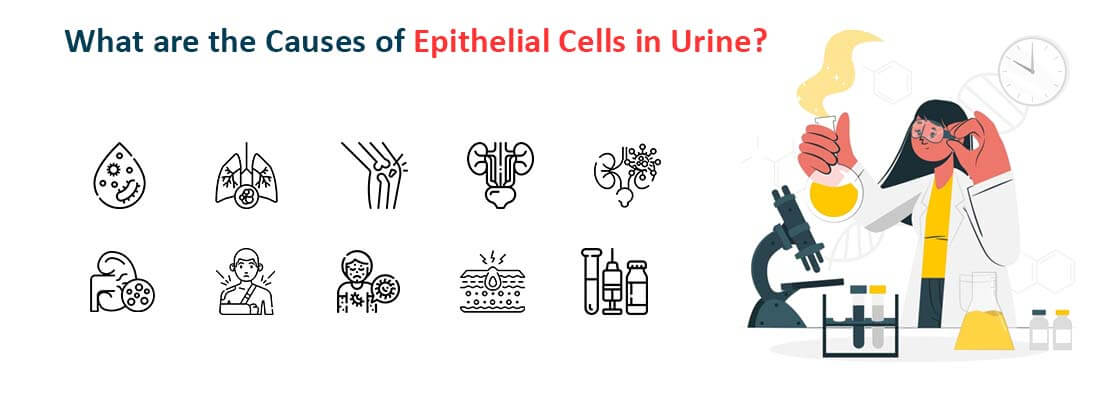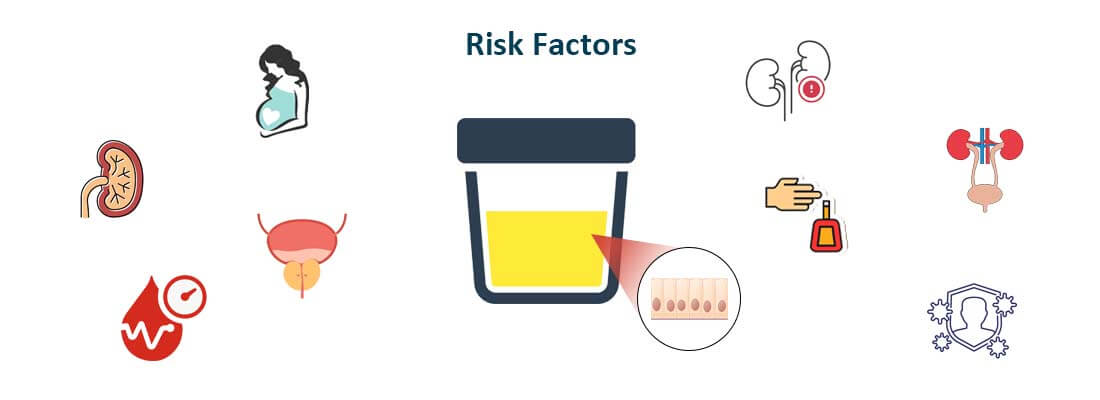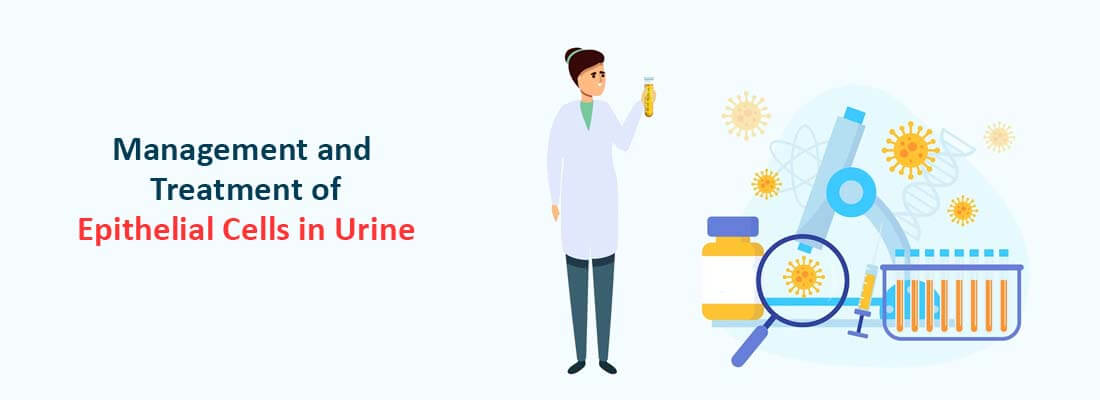
There are not many epithelial cells in healthy urine. Epithelial cell testing can be used to diagnose renal disease, infections, and other illnesses in individuals.
There are not many epithelial cells in healthy urine. Epithelial cell testing can be used to diagnose renal disease, infections, and other illnesses in individuals.
On the exterior of the body, epithelial cells function as a barrier of defense. They impede the entry of viruses into the body.
In addition to covering the skin, epithelial cells are found on the surfaces such as:
- Blood Vessels
- Internal Organs
- Digestive Tract
Urine naturally contains some of these cells. On the other hand, an excess of epithelial cells in the urine typically points to an underlying medical issue.
Three primary categories of epithelial cells exist:
Renal Tubular Cells: Sometimes referred to as renal cells, a rise in renal tubular cells in the urine may be a sign of a kidney problem.
Squamous Cells: The urethra and vagina produce these big epithelial cells. They are the kind that is typically discovered in female urine.
Transitional Cells: These happen in men in the area between the renal pelvis and the urethra. They are also known as bladder cells, and they are typically found in elderly males.
Indication of Underlying Conditions
Normally, it is seen that a very small number of the cells that would be naturally be shed in your urine, it is considered to be a benign process. However, when the epithelial cell presence escalates often, it depicts that your various factors contribute to this occurrence, ranging from your urinary tract infections (UTIs) and the different kidney issues leading to inflammation or an injury.
Why and When to test for the Epithelial Cells in the Urine
Your examination of the epithelial cells in your urine becomes a component of a urinalysis technique, which also quantifies your various chemicals which are present in urine at other different concentrations.
- If any patient presents with symptoms indicative of a kidney disease or urine infection, such as the following:
- Lower abdomen back ache
- Discomfort when urinating
- Epithelial cells in the urine tests are mostly done for a variety of reasons. Sometimes, it could be done when there would be no symptoms related to any increase in the epithelial cell count.
- Any Regular checkup
- Any Abnormality in appearance of the urine sample
- Any Abnormality in chemical composition and parameters of the urine test.
- In case of symptoms such as: painful urination, any frequent urination, your back pain, or any abdominal pain.
Examining the epithelium
Post the urine test, either your chemical or the visual, indicates that your urine includes an increased quantity of the epithelial cells; the doctor would then request for a urinalysis test.
The individual would receive the urine collection container from the center and the doctor prior to the test, along with instructions on how to take the sample.
What are the Causes of Epithelial Cells in Urine?
- Urinary Tract Infections (UTIs)
- Inflammation
- Injury
- Kidney Infections
- Kidney Stones
- Bladder Cancer
- Urologic Cancers
- Trauma
- Yeast Infection
- Contamination
- Structural Abnormalities
- Medications

Note: The UTIs are considered to be one of the most common causes of the epithelial cells found in urine. When your bacteria enters your urinary tract, it could contribute to an inflammatory response, which further causes the sloughing off of the epithelial cells.
Some of the Causes in Detail are as follows:
Urinary Tract Infection
- Cystitis: Affects your bladder
- Urethritis: Affects your urethra
- Kidney Infection: Affects your kidneys
Symptoms of a UTI include
- Frequent Need To Urinate
- Pain While Urinating
- Burning Sensation While Urinating
- Cloudy
- Smelly Urine
- Blood In The Urine
- Pain In The Lower Abdomen
- Feeling Quite Tired
Yeast Infection
The symptoms of any yeast infection include the following:
- Itching in the vagina
- Soreness in the vagina
- Pain while urination
- Clumpy white discharge
Risk Factors
Any person which is at increased risk of having the raised number of the epithelial cells in urine if they have:
- Kidney Stones
- Pregnancy
- Diabetes
- Family History Of Kidney Disease
- Enlarged Prostate
- High Blood Pressure
- Frequent UTI
- Compromised Immune System
- Ethnicity (Asian, African, American Indian, Hispanic)

Symptoms of Epithelial Cells in Urine
Frequent Urination: People may feel the need to urinate more frequently, yet they may only pass little volumes of urine.
Pain or burning sensation: This is typical when urinating, particularly when a UTI is present.
Hematuria, or blood in the urine, can be seen with the unaided eye or only identified by microscopic examination.
Cloudy or Foul-Smelling Urine: Color and odor changes may be apparent.
Fever and chills: These are signs of an infection, particularly when they coexist with other symptoms.
What is Normal Range of the Epithelial Cells in the Urine?
You may regularly have a modest amount of epithelial cells in your urine. On the other hand, a higher concentration of epithelial cells in your urine sample could be a sign of renal disease, an infection, or any other illness. A urine test determines the quantity of epithelial cells in your sample of urine. For individuals of any age and gender, the typical range of epithelial cells never changes.
Less than 15–20 squamous epithelial cells / HPF (high power field) is the ideal range of epithelial cells in urine. When epithelial cells exceed the ideal range, a medical condition may be present.
Cost of Urine Tests in Delhi
The Urine Tests procedures vary by region and facility. So constantly get tested at trustworthy diagnostic centers like Ganesh Diagnostic. It is staffed by trained and experienced professionals to assure patient and visitor safety.
There are multiple tests that are done to monitor any specific symptoms So get your Urine Test done your nearest Ganesh Diagnostic Center.
Note from Ganesh Diagnostic & Imaging Center
Early checkups are always better than delayed ones. Safety, precaution and care are depicted in the several health checkups at our center. We are the Nearby Pathology Lab at your service.
Here, at Ganesh Diagnostic and Imagining Center, we present simple and comprehensive health packages for any kind of testing to ensure the early prescribed treatment to safeguard your health.
Find the Best Urine Test Lab Near you and get your Test done at the earliest.
So, visit us at the earliest to ensure good health and to maintain an active immune system
For Free Consultation from the Doctor
Contact- Dr. Sonal Sharma, (MBBS, MD in Pathology)
Available: 24*7*365
Phone Number: +919212125996
Ganesh Diagnostic and Imaging Centre, the Urine Test Center Near You
Ganesh Diagnostic and Imaging Centre has a long history of offering its patients exceptional service and attention. Years' worth of happy patients in thousands!
Since 2001, it has grown to be a recognized and well-established diagnostic facility.
Their excellence is backed by NABH and NABL Accreditations.
NABH accreditation is proof of highest standard of care and service provided to the patients. NABL accreditation reflects the competency of laboratories and equipment based on some national and international standards.
Test report is available digitally too.
Ganesh Diagnostic and Imaging Centre is a one-stop solution for getting all kinds of tests done, as all services are available under one roof.
The aim of GDIC is to provide world’s finest technology at the lowest price and Free Home Sample Collection Facility.
Access Ganesh Diagnostic and Imaging Center as it is the Urine Test Laboratory Near me, with multiple pathology blood tests, catering to your specific needs.
The rates of scans are reasonably priced. Ganesh Diagnostic and Imaging Centre also offer FLAT 50% OFF on many tests.
The Tests that are conducted at Ganesh Diagnostic & Imaging Center are as follows:
Management and Treatment of Epithelial Cells in Urine
The underlying reason of increased urine epithelial cell counts will determine the course of treatment.

The most frequent cause is a urinary tract infection (UTI), for which antibiotics or antiviral drugs are usually prescribed.
Antibiotics: A course of antibiotics administered by a healthcare provider is typically the first line of treatment if the presence of epithelial cells is caused by a bacterial infection.
Pain Management: In order to reduce the pain and discomfort brought on by urinary symptoms, analgesics may be advised.
Fluid Intake: Drinking more water will help wash out bacteria and improve the health of your urinary system as a whole.
Surgical Intervention: In cases when there are underlying structural problems or malignancy, surgical operations may be required.
Lifestyle Changes: Developing healthful routines, such practicing excellent hygiene and staying away from irritants can help stop similar incidents from happening in the future.
Frequently Asked Questions (FAQs)
Why do epithelial cells increase in urine?
With a raised amount of the epithelial cells in your urine become sign of any minor infection, for example: UTI or any yeast infection. The test for urinalysis and would be for a proper diagnosis.
What happens if epithelial cells are less in urine?
With the Few epithelial cells present in your urine sample indicates the normal range of the epithelial cells in urine. Any number of “Moderate” or “many” epithelial cells in present in the urine test report indicates excess of epithelial cells.
How many epithelial cells in urine is high?
Normal range which is less than the 15 to 20 per HPF; therefore, when there are 15 to 20 of the squamous epithelial cells per HPF, this could indicate contamination in your urine sample. More than 5 of the squamous epithelial cells will be considered indicates an infection or any other health condition.
What is a urine routine test for epithelial cells?
Urine test and routinely test for urinalysis is the test that measures levels of different substances in urine.
Is 8 10 epithelial cells in urine normal?
It is considered to be normal to have around 1-5 epithelial cells in the urine. However, more than the number of 5 epithelial cells that means that there may be have a urinary tract infection or the yeast infection.










